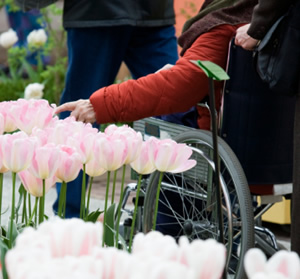Respite Care
 You've heard the term when talking to your Mom's Geriatric Care Manager, or maybe the doctor has used the phrase. But what exactly is respite care?
You've heard the term when talking to your Mom's Geriatric Care Manager, or maybe the doctor has used the phrase. But what exactly is respite care?
Respite care sounds a little more complicated than it actually is. It's any person, organization or activity that you can get your loved one involved with so that you can have a break. Whether it's your neighbor coming in to watch Mom for a few hours while you run errands and have coffee with a friend, or a paid caregiver who comes in 8 hours a day to care for her while you're at work, respite care can be a huge help along the caregiving journey. Respite care is any short-term care; an adult day care center could even be considered respite.
When caring for an Alzheimer's-afflicted loved one, it is crucial that you allow time for yourself. You may be thinking that you can't afford to hire a caregiver to come in and take care of your loved one all day, or maybe you think you can't leave them alone with anyone else. You may be the best possible caregiver for your loved one, but you are not invincible, and you cannot forget your own well-being during your time as caregiver. Caregivers can suffer severe health risks or even sudden death due to stress. Women are especially susceptible to the Superwoman complex, believing that they must do every task themselves so things are done right, or even thinking that they are bothering others when they ask for help. This may or may not come as a newsflash, but Alzheimer's caregiving is not a one-person job!
You should never feel selfish or irresponsible when you take time for yourself, outside of your caregiver role. Take time to exercise, go to the movies, spend time with your spouse and children, take a bath, call a friend on the phone, meditate or pray… all of these things are what make you whole in your everyday life, and caregivers often feel they don't have time for them once they take on this huge responsibility. But please think of it this way: if you are not healthy and whole, you cannot be the wonderful caregiver you want to be for your loved one. People with Alzheimer's disease may not be able to communicate verbally or respond to logic and reason, but they do communicate: through their emotions. If you are tired, stressed, angry, and feeling exhausted, your loved one will absolutely sense those feelings (no matter what words you say, or how much you try to hide it), and she may respond accordingly with anger, frustration or annoyance.
Lastly, even lovers need a holiday! You may need to get out of the house and run errands or spend time with someone other than your loved one, so don't forget that she does, too! It quite probable that your loved one would like to spend time with someone other than you. Variety is the spice of life, after all, and even newlyweds like to get away from each other and see their own friends once in a while. Let that friend who has been offering to help come over for tea, or have one of your siblings stay with your loved one for a bit. You may be surprised that you'll come back to a cheerful home when you do.
For help finding a respite care provider in your area, talk to your Geriatric Care Manager, Elder Law attorney, or visit www.visitingangels.com





 Alzheimer's Hope Forum & Message Boards
Alzheimer's Hope Forum & Message Boards